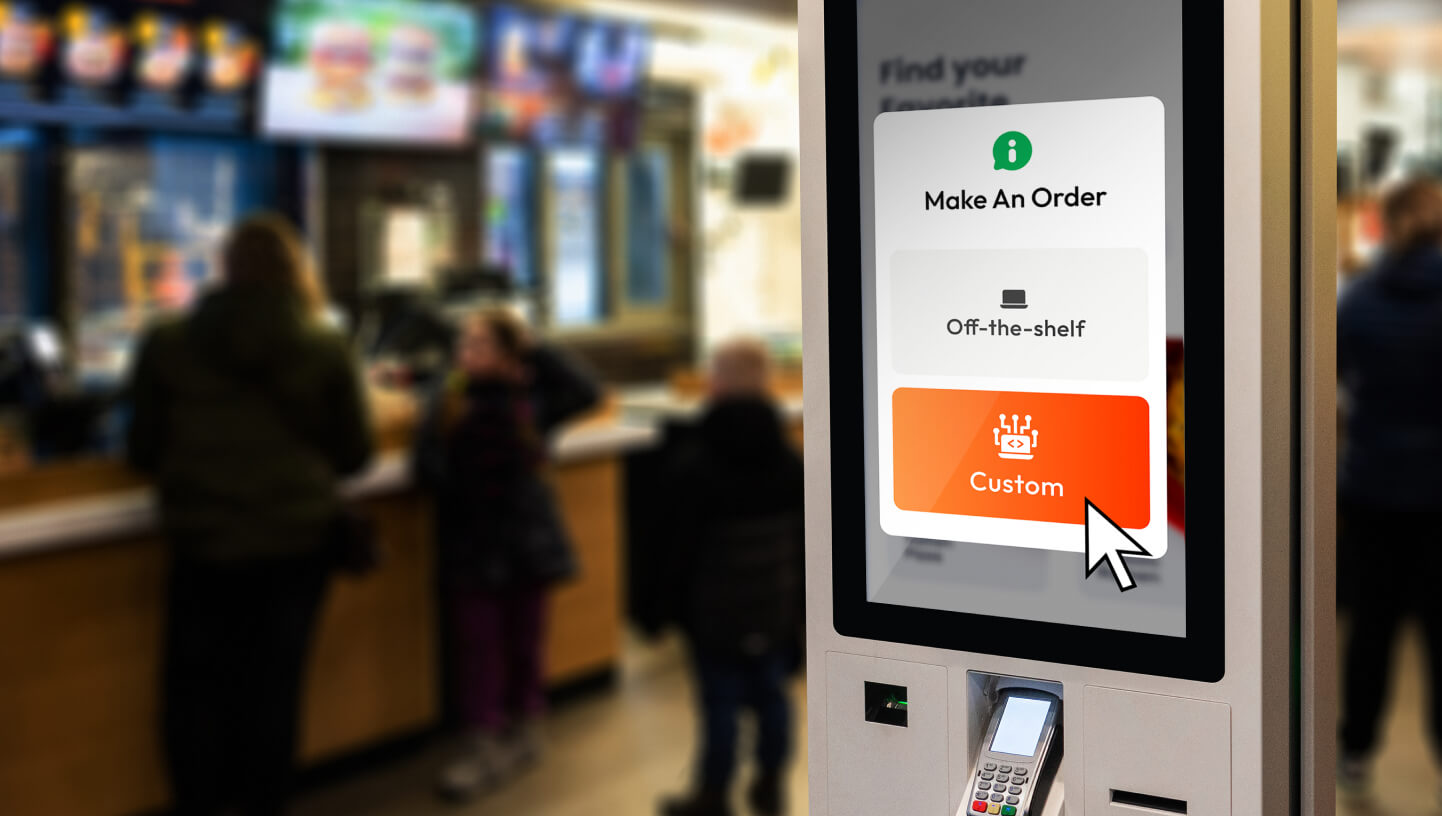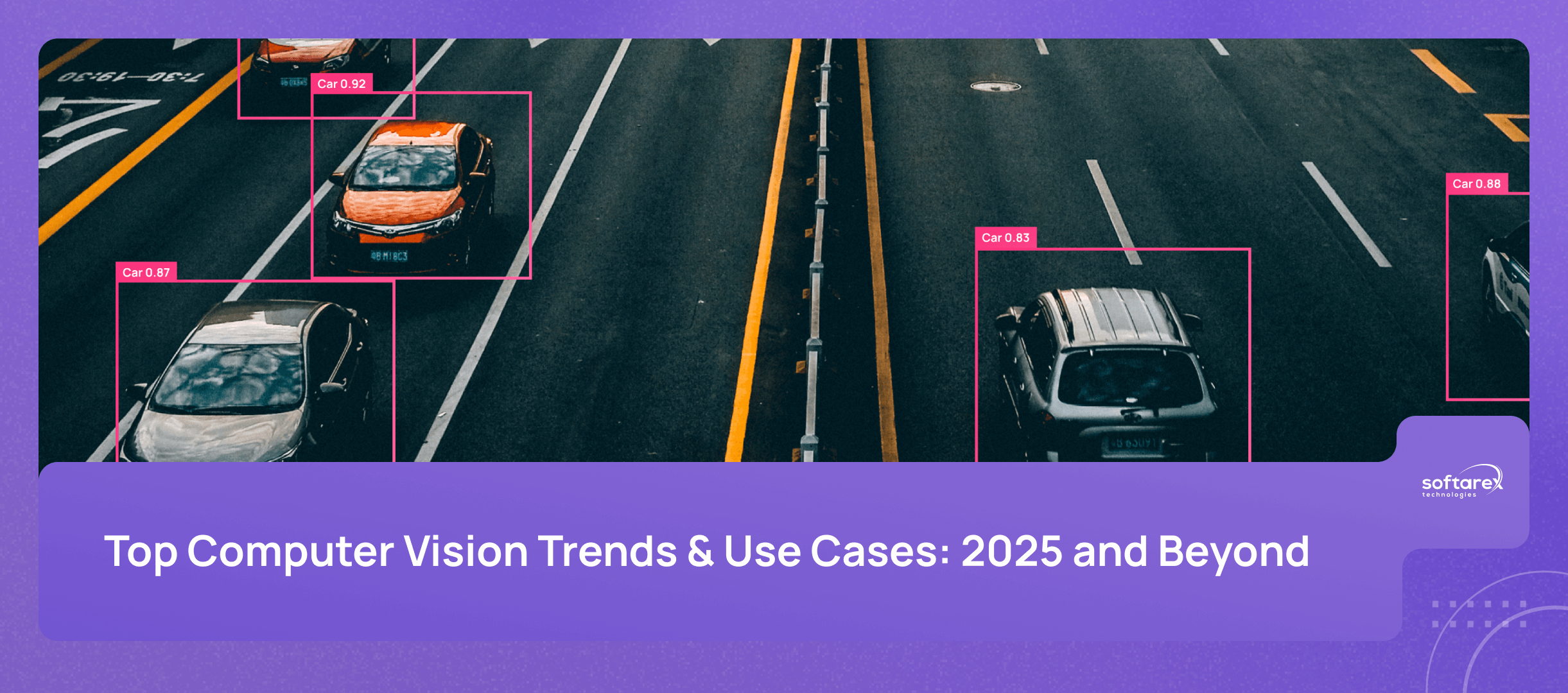Custom-built software is rapidly gaining traction in the quick service restaurant industry. Despite the relatively high initial costs, more and more QSR companies are opting for tailored solutions over off-the-shelf software. This shift towards proprietary tech includes not only one-off apps but also entire operating systems built from scratch..
Nation’s Restaurant News predicts that “within 10 years, most of the largest restaurant companies will bring their technology operations in-house”.
What are the reasons behind this rapid shift, and what benefits do brands gain from choosing tailored software? Find out as we address these questions and more in the article below.
Why Take the Proprietary Tech Route?
In 2023 the restaurant industry was still recovering from the aftermath of the pandemic and getting back on its feet by testing and offering a wide range of bold concepts and ideas, including drone delivery, advanced online ordering, contactless customer service, AI-driven personalization, and high-tech store prototypes. And in 2024 the race to win customers’ hearts seems to be only gaining momentum.
Looking to meet the ever-increasing customer expectations and catch up with the innovations in the retail industry, quick service restaurant brands are returning to the driver’s seat by trading in ready-made software for tailored solutions. The list of innovators includes such major industry players as Wingstop, Yum Brands, Sweetgreen, Restaurant Brands International, and Marco’s Pizza. They either only announced plans to go off off-the-shelf or already terminated their long-term third-party vendor partnerships and shared the details of their new technology.
Nation’s Restaurant News claims that this isn’t merely an experiment but one of the major industry trends in 2024. They predict an increasing number of brands recognizing the benefits of custom tech. “In 2024, expect more restaurant chains (especially larger companies) to announce investments in proprietary tech. Despite the upfront expense, the unobstructed access to data and custom builds could be worth it in the long-run”.
With their proprietary solutions, brands are looking to cover a wide range of everyday activities, including ordering, delivery, retail, inventory management, staff scheduling, real-time kitchen process monitoring, and much more.
But why invest in proprietary tech when there’s plenty of software catered to every restaurant’s need on the market? There are actually a few good reasons for that.
Personalization
Personalization is no longer either a luxury or a whim, it’s an expectation. More than ever, customers do not simply want, they expect tailored experiences and base purchase decisions on whether a brand can satisfy their unique needs and make them feel like a VIP or not. And stats prove it. 58% of diners, more than a half (!), will recommend a quick-service restaurant if they get personalized treatment. And 33% won’t order from a brand that doesn’t customize experience to their preferences. This is a whopping 12% increase from last year.
Realizing the need for a change, big players are steadily morphing from mere technology users to technology creators. “To gain market share and to gain the attention of the guest, you have to have these convenient, personalized experiences. And the only way to do that is to build [a team with] software talent,” said Doug Cook, the CTO of Jack in the Box.
By investing in in-house solutions brands unlock a new level of access to customer data off-the-shelf software doesn’t provide. “This [our new proprietary system] is actually going to allow us to continue to acquire more data on our guests but then lean in and actually use that data to personalize that guest experience as they engage with our brand digitally,” said Wingstop’s CEO Michael Skipworth.
With first-party information at their fingertips, brands can get valuable insights into their consumers’ behavior, their likes and dislikes and use them to create personalized experiences, for example, by tailoring promotions and suggestions via mobile apps.
Visibility
Another crucial advantage proprietary tech brings to restaurant brands is increased transparency. According to Wingstop CEO Michael Skipworth, custom solutions are especially beneficial to franchisees as they offer “more insights and more visibility into the business within the four walls of the restaurants.”
YumBrands, for example, is already harnessing the power of transparency with its custom-built commerce platform. The solution serves as a centralized hub, owned and controlled internally, that covers all the company’s brands and provides comprehensive data on business performance, indicating progress and spotlighting areas of improvement.
Flexibility For Custom Features
No matter how flexible off-the-shelf software is, there’ll always be a specific need it won’t be able to cater to, especially in something as rapidly changing and customer-oriented as the restaurant industry. Recognizing this limitation, companies invest in proprietary tech.
Like, for example, Marco’s Pizza that has lately terminated all its third-party vendor partnerships. “We realized we need to be in the driver’s seat, and do the customizations that our franchisees and our customers demand”, said Milton Molina, the brand’s VP of Store Technology.
The new system is developed with a pizza franchise in mind. Unlike a traditional off-the-shelf software, it transfers an order from the store to the bar automatically in a matter of just a few seconds, significantly reducing customer wait times. Other features of the software include a staff scheduler, tailored to the needs of a pizza chain, and a food cost management module for real-time inventory tracking.
What else makes a custom-built solution a great investment into the future is that it gives brands more opportunities to stay abreast of the latest technology. It has actually become one of the reasons Marco’s Pizza decided to go in-house. “The beautiful thing about this system”, says Milton Molina, “is that if there’s something out there that becomes a trend and something that we need, we can very easily add it on or plug it into our system.”
So, if tomorrow brings a hot new digital trend like, say, AI voice ordering at a drive-thru or technology-enabled menu boards, a quick service restaurant with its own proprietary tech stack will be unlikely to fall behind the competition. It will build and add new functionality tailored to its requirements, satisfying customers’ hunger for fresh-from-the-oven features.
Optimized Operations
QSRs are going digital all the way, using the capabilities of technology to achieve greater levels of process optimization and stand out in the market.
One of the great examples of such transformation is YumBrands. According to its CEO, the company aspires to “be the leader when it comes to proprietary tech in the restaurant industry”. And despite all its recognition it doesn’t rest on its laurels. Instead it’s investing heavily in in-house solutions and steadily expanding its digital portfolio.
The brand’s proprietary tech suite spans across almost every, if not all areas of quick service restaurant business. Yum’s POS system Poseidon conveniently covers order management, cash management and real-time store reporting from one hub. The custom-built SuperApp provides restaurant managers with tools for automating everyday operations, saving them time and effort for more crucial activities. The company’s AI-powered inventory system simplifies the restocking process by predicting and suggesting the quantity of each product a manager should order.
And the last ingredient of Yum’s winning recipe is its in-house commerce platform. This solution not only improves the visibility with data-based insights, as we’ve mentioned above, but also enables the company to save time and money on marketing campaigns. Today, a promotion can be built and launched “in a matter of weeks”, says Yum’s CFO Christopher Turner. “Previously, the process would have taken months with significant third-party expense”.
Proprietary tech is also invaluable in the kitchen. Sweetgreen, an ambitious digital disruptor, is furnishing its locations with proprietary robots that assemble customers’ orders on a conveyor belt. So far, the project has been showing incredible results. Apart from improved restaurant throughput and more precise order portioning, Sweetgreen’s innovation has increased production by a whopping 50% by “cooking” up to 500 dishes an hour. Though robots don’t replace human workers completely, they reduce the number of employees needed to assemble salads from 7-9 to just 1-2, freeing up staff and allowing it “to focus more on customer experiences”, according to the brand’s CEO Jonathan Neman.
For the companies with a nearly fully franchised business model, going the proprietary route is a way to stay ahead of the curve. Investing in owned tech stack that streamlines workflows for operators enhances the competitiveness of franchise programs, enabling brands to gain a competitive edge over other industry players.
Cost-Savings
There’s no doubt that building a tech stack is a costly endeavor. Currently the companies in the process of developing their own online ordering systems or ecommerce platforms are mainly big players that can cover the upfront investment. However, it “could be more beneficial in the long run than trying to piece together a formula for the perfect tech stack for a brand’s specific needs from several vendors”, believes Nation’s Restaurant News.
Marco’s Pizza case demonstrates one of the ways QSRs can actually cut their digital costs by going in house. Since the new proprietary tech solution is completely cloud-based, the brand doesn’t need any middleware. Additionally, Marco’s software is device-agnostic, meaning that it can seamlessly run across various gadgets and systems with no additional adjustments. This will save a pretty penny not only the brand as a whole, but also its franchisees.
Balancing Hospitality With Innovation
Not every quick service restaurant, however, is ready to reposition itself as a tech company. Like Domino’s did back in 2015, when its former CEO J. Patrick Doyle famously declared: “We are as much a tech company as we are a pizza company.” Such a drastic metamorphosis is rather an exception than a must-follow example.
Most QSRs, even the biggest digital pioneers in the industry, prefer to stay focused on what matters the most — the food, the restaurant experience, the business value, and the brands. They view technology only as a means of achieving their goals, rather than the core of their business.
For those not investing directly in proprietary tech, the alternative approach is seeking committed partnerships with technology companies. This allows them to translate their strategic goals into custom solutions powered by the latest technology. All they have to do is find the right partner.
And what makes a suitable partner? First of all, they should have the skills and knowledge relevant for your project. If, say, you want to develop a voice assistant, you want a contractor who has expertise in AI. And if you’re going to build an inventory management system with forecasting capabilities, look for companies specializing in predictive analytics.
Another important thing for you as a restaurant brand to look for in a partner is prior experience in the restaurant industry. It’s crucial that they understand the ins and outs of the business, including the requirements for compliance and security.
And the last thing you’d want to do when choosing a software development contractor is to make sure the company you’re signing up with has the flexibility, skills and knowledge to pivot to meet your new needs and adjust to the rapidly changing industry trends.
About Softarex
Softarex is a team of seasoned experts in Artificial intelligence, Computer vision, Machine learning and Predictive analytics. With 23 years of experience in custom software development and a portfolio of restaurant projects we know how to deliver tangible results to businesses with tailored proprietary tech.
If you are considering building proprietary software, feel free to reach out to us. Our specialists will assist you in executing a digital transformation strategy that will drive efficiency, optimize daily operations and give you the competitive edge over other QSRs.
To explore comprehensive strategies for implementing artificial intelligence solutions in restaurant operations, download our detailed eBook, Transform Your Restaurant with AI-Powered Solutions. This resource examines practical AI applications, implementation frameworks, and emerging technologies that are revolutionizing restaurant management, customer experience, and operational efficiency.









